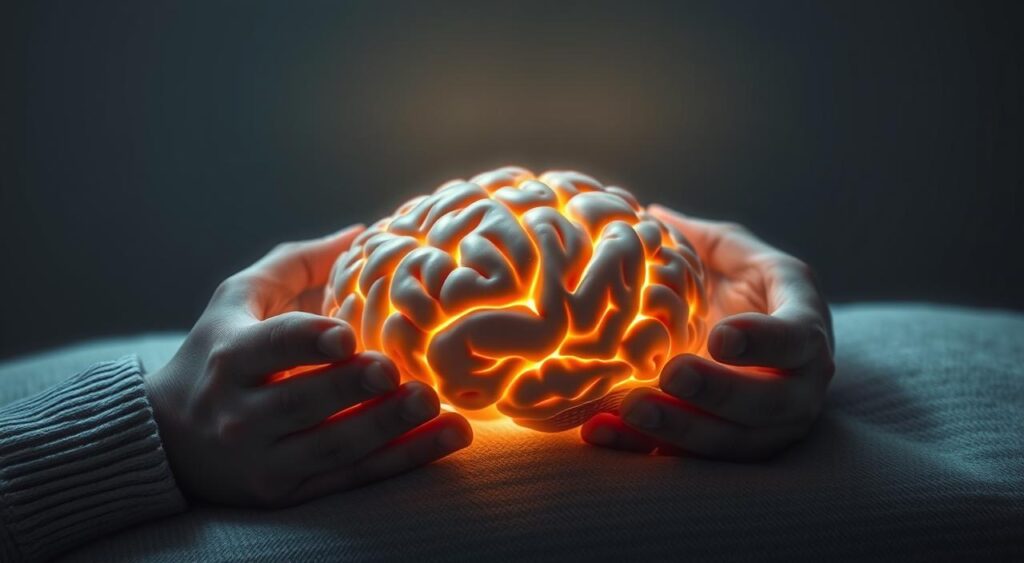Uncover the mysteries of Unspecified Neurocognitive Disorders and find helpful information to better understand this unique neurological challenge.
One in five people over 65 face cognitive issues, with unspecified neurocognitive disorders playing a big role. These disorders affect memory, attention, and decision-making without a known cause. They make daily tasks hard for those affected.
It’s key to understand these disorders to improve life quality. This includes finding better ways to manage them.

Key Takeaways
- Unspecified neurocognitive disorders affect a significant portion of the population, particularly those over 65.
- Cognitive impairment can manifest in various ways, including memory loss and difficulty with decision-making.
- Unspecified neurocognitive disorders can have a profound impact on daily life, making everyday tasks a challenge.
- Understanding the causes and symptoms of unspecified neurocognitive disorders is essential for developing effective management strategies.
- Early diagnosis and intervention can significantly improve the quality of life for individuals with unspecified neurocognitive disorders and cognitive impairment.
- Further research is needed to fully understand the complexities of unspecified neurocognitive disorders and cognitive impairment.
Understanding Unspecified Neurocognitive Disorders
Unspecified neurocognitive disorders affect how we think and remember. They can make it hard to focus and solve problems. These conditions are part of a group that impacts our brain’s function.
Knowing how to classify these disorders is key for treatment. Cognitive function is at the heart of these issues. Understanding its role helps us find better ways to manage them.
Definition and Clinical Classification
These disorders are marked by a decline in brain function. This can happen due to illness, injury, or substance use. Doctors classify them by checking how well our brain works, including memory and problem-solving skills.
Key Characteristics
Some main traits of these disorders include:
- Cognitive decline, which can show as memory loss or trouble focusing
- Impaired brain function, affecting daily life and quality of life
- Different levels of severity, from mild to severe
Differentiation from Other Cognitive Conditions
It’s important to tell these disorders apart from others like Alzheimer’s or dementia. A detailed check-up, including brain tests, helps figure out the cause of brain decline.
By grasping the definition, classification, and key traits of unspecified neurocognitive disorders, we can tackle these conditions better. This helps us find ways to slow down brain decline and keep our brain function sharp.
| Disorder | Cognitive Decline | Cognitive Function |
|---|---|---|
| Unspecified Neurocognitive Disorder | Mild to severe | Impaired |
| Alzheimer’s Disease | Severe | Significantly impaired |
| Dementia | Severe | Significantly impaired |
Common Signs and Symptoms
Unspecified neurocognitive disorders show many signs and symptoms. These include memory loss and a decline in cognitive abilities. As the condition gets worse, people may find it hard to communicate, solve problems, and make good judgments.
Some common signs of unspecified neurocognitive disorders include:
- Forgetting recently learned information or important dates
- Difficulty with problem-solving or making decisions
- Struggling to understand written or spoken language
- Mood changes, such as depression or anxiety
It’s crucial to spot the early signs of dementia and memory loss. Early detection and action can greatly improve the life quality of those affected.
Knowing the common signs and symptoms of unspecified neurocognitive disorders helps. It lets people take steps to keep their brain healthy. This can lower the risk of getting these conditions.
| Signs and Symptoms | Description |
|---|---|
| Memory Loss | Forgetting recently learned information or important dates |
| Cognitive Decline | Difficulty with problem-solving or making decisions |
| Mood Changes | Depression, anxiety, or other emotional changes |
Risk Factors and Potential Causes
Unspecified neurocognitive disorders can be caused by genetics, environment, and lifestyle. Keeping your brain health in check is key to lowering your risk. Studies show that people with a family history of these disorders are more at risk. This points to the role of genetics.
Several factors can lead to these disorders, including:
- Genetic predisposition: Family history and genetic mutations can increase the risk of developing these disorders.
- Environmental factors: Exposure to toxins, pesticides, and other harmful substances can affect brain health and contribute to the development of neurocognitive disorders.
- Lifestyle influences: Poor diet, lack of exercise, and social isolation can all impact brain health and increase the risk of developing these disorders.
- Medical conditions: Certain medical conditions, such as diabetes and hypertension, can also contribute to the development of unspecified neurocognitive disorders.
Knowing these risk factors is key to keeping your brain health in top shape. By choosing a healthy lifestyle and managing health issues, you can protect your brain health.
| Risk Factor | Description |
|---|---|
| Genetic Predisposition | Family history and genetic mutations |
| Environmental Factors | Exposure to toxins and harmful substances |
| Lifestyle Influences | Poor diet, lack of exercise, and social isolation |
| Medical Conditions | Certain medical conditions, such as diabetes and hypertension |
The Diagnostic Process
The process to diagnose neurocognitive disorders is detailed. It involves a thorough cognitive assessment to check for cognitive issues. This step is crucial to understand how much a person’s thinking skills are affected.
This assessment includes various tests. These help to see how well someone remembers, pays attention, uses language, and solves problems.
A cognitive assessment might include:
- Neuropsychological tests to check cognitive functions
- Medical history and physical check-ups to find other health issues
- Laboratory tests to find the cause of problems

Getting a full cognitive assessment is key. It helps create a good treatment plan. It also gives people the support they need to handle their condition.
Clinical Assessment Methods
Clinical assessment methods are key in checking people with unclear brain disorders. They help doctors see how much brain function is lost. This helps in making good treatment plans. A big part of this is cognitive rehabilitation, which helps patients get better.
Assessment methods include:
- Cognitive function tests to check memory, attention, and solving problems
- Neurological exams to look at how well the body moves and reacts
- Brain imaging studies, like MRI or CT scans, to see the brain’s structure and how it works
These tests give important info on why someone’s brain isn’t working right. They help make cognitive rehabilitation plans that fit each person’s needs. This way, doctors can make treatment plans that really help each patient.
| Assessment Method | Purpose |
|---|---|
| Cognitive Function Tests | Evaluate memory, attention, and problem-solving skills |
| Neurological Examinations | Assess motor function, reflexes, and coordination |
| Brain Imaging Studies | Visualize brain structure and function |
By using these clinical assessment methods, doctors can make treatment plans that really help. These plans focus on cognitive rehabilitation to improve patient outcomes.
Treatment Approaches and Management Strategies
Improving cognitive function is key in treating unspecified neurocognitive disorders. Different methods can help slow cognitive decline and boost brain health. These include medicines, cognitive training, and changes in lifestyle.
Some effective strategies for managing cognitive decline include:
- Engaging in regular physical exercise to improve blood flow to the brain
- Practicing cognitive training exercises, such as puzzles and memory games
- Following a balanced diet rich in fruits, vegetables, and omega-3 fatty acids
Research shows that social engagement and stress reduction, like meditation and yoga, can also improve cognitive function and slow decline.
By incorporating these strategies into daily life, individuals can take a proactive approach to managing their cognitive health and reducing the risk of further decline.
It’s crucial to work with a healthcare professional to create a personalized treatment plan. The best approach will depend on the individual’s specific needs and situation.
| Treatment Approach | Description |
|---|---|
| Pharmacological Interventions | Medications to manage symptoms and slow cognitive decline |
| Cognitive Training | Exercises and activities to improve cognitive function |
| Lifestyle Modifications | Changes to diet, exercise, and stress management to support brain health |
Living with Cognitive Impairment
People with cognitive impairment face big challenges every day. They need to find ways to manage memory loss and other symptoms. This helps them stay independent and live a good life.
Creating schedules, using memory aids, and following a daily routine are key. These steps help deal with dementia symptoms.
Support systems are very important. Family, caregivers, and support groups can offer a lot of help. They can make a person feel less alone and provide emotional support.
Daily Management Tips
- Break down tasks into smaller, manageable steps
- Use calendars and reminders to stay organized
- Establish a regular exercise routine to improve cognitive function
It’s also important to think about quality of life. This includes staying connected with others, enjoying hobbies, and finding activities that make you happy. Doing things that bring joy helps people with cognitive impairment keep their sense of purpose and identity.
Quality of Life Considerations
Quality of life is crucial for those with cognitive impairment. It’s about keeping social connections, doing things that challenge the mind, and finding resources for well-being. By focusing on these areas, people can live better lives despite memory loss and dementia.
| Strategy | Benefits |
|---|---|
| Cognitive Stimulation | Improves cognitive function, reduces risk of further decline |
| Social Engagement | Enhances emotional well-being, reduces feelings of isolation |
| Support Networks | Provides emotional support, helps with daily management |
Impact on Caregivers and Family Members
Caring for a loved one with an unspecified neurocognitive disorder is tough and emotional. It’s key for caregivers and family to focus on their brain health. This helps them avoid burnout and keep caring well.
Here are some ways to support brain health:
- Regular exercise to lower stress and boost mood
- Mindfulness and meditation to improve thinking
- Seeking support from friends, family, or groups to feel less alone
By caring for their brain health, caregivers can handle the tough parts of caring better. It’s vital to remember self-care and ask for help when needed. This ensures the well-being of both the caregiver and the person with the disorder.

Latest Research and Medical Advances
Researchers are making big strides in understanding and managing unspecified neurocognitive disorders. Recent studies have uncovered the complex links between cognitive impairment, genetics, and environment. The aim is to create better diagnostic tools and treatments for those affected.
Some key areas of focus include:
- Investigating the role of cognitive impairment in unspecified neurocognitive disorders
- Developing new treatments and therapies to alleviate symptoms and improve quality of life
- Exploring the potential of genetic testing and personalized medicine in diagnosis and treatment
As research advances, there’s growing hope for better diagnosis and treatment options. By keeping up with the latest research, we can better understand these complex conditions. This will help improve the lives of those affected.
Studies are also looking at how lifestyle factors, like diet and exercise, affect cognitive impairment and these disorders. By adopting healthy habits, individuals can reduce their risk and promote brain health.
Current Studies
Ongoing research aims to uncover the underlying mechanisms of unspecified neurocognitive disorders, focusing on cognitive impairment. By understanding these mechanisms, scientists can develop more effective treatments. This will improve outcomes for those affected by these conditions.
Future Directions
As our understanding of these disorders grows, new treatments are likely to emerge. These may include innovative therapies like cognitive training programs and new medications. These will be designed to meet the complex needs of individuals with these conditions.
| Research Area | Description |
|---|---|
| Cognitive Impairment | Investigating the role of cognitive impairment in unspecified neurocognitive disorders |
| Genetic Testing | Exploring the potential of genetic testing and personalized medicine in diagnosis and treatment |
| Lifestyle Factors | Examining the impact of lifestyle factors, such as diet and exercise, on cognitive impairment and unspecified neurocognitive disorders |
Prevention and Brain Health Maintenance
To prevent or slow neurocognitive disorders, we need to take care of our brains. This means making lifestyle changes, doing brain exercises, and taking other steps. Getting a cognitive assessment is key to finding out what we need to work on.
Regular cognitive assessment helps us know our brain’s strengths and weaknesses. This lets us create a plan for cognitive rehabilitation. Activities like reading, puzzles, or learning something new can help keep our brains sharp.
Lifestyle Modifications
- Engaging in regular physical exercise to improve blood flow to the brain
- Following a balanced diet rich in fruits, vegetables, and whole grains
- Getting adequate sleep and practicing stress-reducing techniques
By making these lifestyle changes and doing brain exercises, we can keep our brains healthy. Cognitive rehabilitation is also important in preventing or slowing these disorders. It should be part of our overall plan to keep our brains in top shape.
Conclusion: Navigating the Journey of Neurocognitive Disorders
Understanding neurocognitive disorders is key to managing them well. Cognitive issues can really affect our daily lives. It’s important to know the signs and symptoms.
Keeping our brains healthy is crucial in preventing and managing these disorders. Cognitive tests and rehabilitation are also vital. They help us deal with neurocognitive disorders.
Recent studies highlight the need for early diagnosis and treatment. By keeping up with medical news and doing cognitive exercises, we can protect our brain health. Neurocognitive disorders are tough, but with the right approach, we can see improvement.
There’s hope for the future with ongoing research and new treatments. This gives us optimism for managing and treating these disorders.
As we learn more about neurocognitive disorders, we must focus on brain health and cognitive function. This way, we can improve the lives of those affected. With the right knowledge, support, and resources, we can face neurocognitive disorders with confidence and hope.
FAQ
Q: What are unspecified neurocognitive disorders?
A: Unspecified neurocognitive disorders are conditions that affect how we think and remember. They cause memory loss and cognitive decline. But they don’t meet the full criteria for specific disorders like dementia.
Q: What are the common signs and symptoms of unspecified neurocognitive disorders?
A: Signs include memory loss and trouble with communication and problem-solving. Mood and personality changes are also common. These symptoms can affect daily life in different ways.
Q: How are unspecified neurocognitive disorders diagnosed?
A: Diagnosis involves a detailed cognitive assessment. This includes tests, neurological exams, and brain imaging. A full medical history and physical exam are also needed to rule out other causes.
Q: What are the risk factors for developing unspecified neurocognitive disorders?
A: Risk factors include genetics, environment, lifestyle, and medical conditions. A healthy lifestyle can help reduce risk. This includes a balanced diet, exercise, and staying socially active.
Q: Can unspecified neurocognitive disorders be treated?
A: There’s no cure, but treatments can help. These include medication, cognitive training, and lifestyle changes. These approaches can improve function and slow decline.
Q: How can caregivers and family members support individuals with unspecified neurocognitive disorders?
A: Caregivers and family members are crucial. They provide emotional support and practical help. Encouraging a healthy lifestyle and cognitive activities is key. It’s also important for caregivers to take care of their own brain health.
Q: What is the latest research on unspecified neurocognitive disorders?
A: Research aims to understand causes and find treatments. Studies focus on cognitive assessment and rehabilitation. The goal is to improve outcomes for those affected.
Q: Can unspecified neurocognitive disorders be prevented?
A: Prevention is not guaranteed, but lifestyle changes can help. Keeping the brain active and healthy is important. Regular assessments can also guide rehabilitation efforts.
